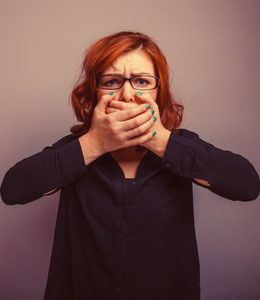Stop (Saying) Factory Farming!
By Hope Bohanec, Projects Manager for United Poultry Concerns
 Farmed animal advocates can be proud that we’ve come a long way in educating the public about the horrors of animal agriculture. Just a few decades
ago soy milk was often available only in powdered form, and if you wanted a vegan cookie, you had to bake it yourself. Vegans often ventured into
restaurants with trepidation for fear of their sanity–and leave hungry. Now, there are vegan chain restaurants and vegan doughnuts alongside national
media stories about caged hens, immobilized sows, overcrowded cows, and tortured baby chickens and turkeys. The fact that animals suffer to produce the
meat, milk and eggs that people consume is becoming common knowledge, and the term vegan is now a household word.
Farmed animal advocates can be proud that we’ve come a long way in educating the public about the horrors of animal agriculture. Just a few decades
ago soy milk was often available only in powdered form, and if you wanted a vegan cookie, you had to bake it yourself. Vegans often ventured into
restaurants with trepidation for fear of their sanity–and leave hungry. Now, there are vegan chain restaurants and vegan doughnuts alongside national
media stories about caged hens, immobilized sows, overcrowded cows, and tortured baby chickens and turkeys. The fact that animals suffer to produce the
meat, milk and eggs that people consume is becoming common knowledge, and the term vegan is now a household word.
Much of this progress is the result of animal advocates’ strategic campaign against “Factory Farming.” For decades, animal activists have
inscribed the motto “End Factory Farming” in brochures and splattered “Stop Factory Farming” on protest signs with red letters
dripping like blood. The term “factory farming” conjures up images of endless rows of animals in barren cages and windowless warehouses, of
animals suffering and dying on manure-covered concrete floors and being mercilessly treated by their owners.
The ubiquity of images and conditions associated with “factory farming” has spawned a pervasive condemnation. Just about everyone agrees that
we must stop “factory farming.” But this rallying cry has created an unforeseen consequence, one that animal exploiters are taking full
advantage of. They’re jumping on the bandwagon proclaiming that their products are not factory farmed; theirs are organic
. . . local . . . humane . . . cage-free . . . (insert any number of misleading labels here). Likewise, when consumers hear the offensive words
“factory farming,” many are now thinking, “Oh, but my meat (or dairy or eggs) isn’t factory farmed, I buy it at Whole
Foods” (or “it’s organic, “free-range,” etc.).
What’s the Difference?
I so often hear farmed animal advocates telling people that “99% of meat, dairy and eggs is factory farmed.” Unfortunately, this encourages
people to
think that the remaining 1% is humane. Does anyone actually believe that 1% of animal agriculture is somehow pampering animals with comfortable, happy
lives where there is no separation of families, no painful mutilations, no terrifying slaughter? This is simply untrue. ALL animal farming is
“factory” farming. As long as animals are commodified, there is exploitation, suffering, and a lack of respect for the animals themselves.
Dangerous Common Ground
The popular reprobation of “factory farming” has inadvertently created a demand for products euphemistically associated with “humane,
alternative, small-scale” animal farming. For many animal advocates, this was not the initial purpose of denouncing factory farming, but it is the
unintended and dangerous common ground whereby the rhetoric of the animal rights movement has been appropriated by our opposition to promote the very
products we condemn. Now when we denounce animal products by chanting “Stop Factory Farming,” we’re ironically repeating the marketing
slogans of a sector of animal agribusiness that is catering to a sector of “conscientious consumers.”
Calls to “End Factory Farming” No Longer Suffice
Given the cooption of our message, it is time for animal advocates to abandon calls to “End Factory Farming.” Instead, we must specifically
call for an end to all forms of Animal Agriculture. We must speak in ways that express the truths that all animal farming is exploitive,
abusive, and degrading to animals and that there can never be a humane way to breed, confine, control, and kill animals to obtain their
“products.” For the sake of all animals, we have to update our language and expand the consciousness of society. It is time to retire calls to end factory farming and to call instead for an end to Animal Farming.
HOPE BOHANEC is the Projects Manager for United Poultry Concerns and the author of The Ultimate Betrayal: Is There Happy Meat?.
She is also the creator and narrator of the video: Humane Hoax: The Deception Behind “Humane” Food Labels.
Both book and video are available from UPC at
www.upc-online.org/merchandise, and the video can be watched free of charge on our website by clicking on Videos & Presentations on
our homepage.
|
|